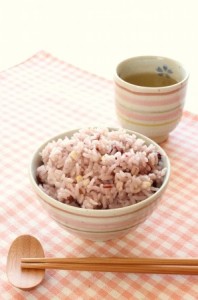Dietary Nutrition – Basic Concepts
 As the typical advice goes, a healthy diet is the foundation of a healthy body. In general, a healthy diet means choosing anti-Inflammatory foods as the basis for all meal. As you will see below, an Anti-Inflammatory Diet works in harmony with the ancient dietary principles from both Chinese and Ayruvedic Medicine.
As the typical advice goes, a healthy diet is the foundation of a healthy body. In general, a healthy diet means choosing anti-Inflammatory foods as the basis for all meal. As you will see below, an Anti-Inflammatory Diet works in harmony with the ancient dietary principles from both Chinese and Ayruvedic Medicine.
It has become increasingly clear that many illnesses (including heart disease, many cancers and Alzheimer’s disease) are influenced in large part by chronic inflammation. Inflammation is a process in which the immune system becomes off balance, and persists unnecessarily in its efforts to repair the body and clear pathogens. The prolonged imbalance results in damage to healthy tissue as well. Stress, lack of exercise, genetic predisposition and other lifestyle factors can all promote inflammation, but poor diet is  perhaps the main contributor, and the ideal place to begin addressing inflammation.
perhaps the main contributor, and the ideal place to begin addressing inflammation.
The Anti-Inflammatory Diet is not really a diet in the usual sense; it is not intended as a weight-loss program (although people can and do lose weight on it), nor is it an eating plan to stay on for a limited period of time. Rather, it is way of selecting and preparing foods based on scientific knowledge of how they can help your body remain optimally healthy. Along with influencing inflammation, this diet will provide steady energy and ample vitamins, minerals, essential fatty acids and dietary fiber.
You can also adapt your existing recipes according to these anti-inflammatory diet principles:
General Diet Tips:
- Aim for variety – eat many colors and types of foods, rotated seasonally.
- Include as much fresh food as possible. Real food “goes bad” quickly – this is a good thing.
- Minimize your consumption of processed foods and fast food.
- Eat an abundance of fruits and vegetables.
Carbohydrates:
- Reduce your consumption of “whole grains”, especially those foods made with wheat and wheat flour.
- Get more of your carbohydrate calories from nutrient-dense vegetable sources like carrots, winter squashes, sweet potatoes, beets and squash.
- Avoid products made with refined sugar or high fructose corn syrup.
Fat:
- Fat is good (but quality matters)! It is healthy to eat some saturated fat from high-quality sources like coconut, ghee and high-quality animal products.
- May people have dairy allergies/sensitivities and should reduce or eliminate butter, cream, cheese and other full-fat dairy products. People that tolerate dairy products can use full-fat, high-quality dairy products as a great source of nutrients.
- Use coconut oil as a main cooking oil. After the cooking is done, extra-virgin olive oil can be added to give flavor to foods.
- Avoid industrial seed oils such as: safflower and sunflower oils, corn oil, cottonseed oil, and mixed vegetable oils.
- Strictly avoid hydrogenated oils such as margarine, vegetable shortening, and all products listing them as ingredients.
- Include in your diet avocados and nuts, especially walnuts, cashews, almonds, and nut butters made from these nuts. For omega-3 fatty acids, eat salmon (preferably fresh or frozen wild or canned sockeye), sardines packed in water or olive oil, herring, and black cod (sablefish, butterfish); omega-3 fortified eggs; hemp seeds and flaxseeds (preferably freshly ground); or take a fish oil supplement (see below).
Protein:
- On a 2,000-calorie-a-day diet your daily intake of protein should be between 80 and 120 grams. Eat less protein if you have liver or kidney problems, allergies, or autoimmune disease.
- Make sure that the animal protein you purchase is good quality – this includes wild-caught fish, grass feed beef, organic chicken and organic eggs.
- Eat some vegetable protein, especially from nuts and seeds.
- Beans are not easy to digets and should be eaten in limited amounts (or not at all).
Fiber
- Try to eat 30+ grams of fiber a day. You can achieve this by increasing your consumption of fruit, especially berries, and fiber-rich vegetables.
- Take a fiber supplement if needed.
Phytonutrients:
- To get maximum natural protection against age-related diseases (including cardiovascular disease, cancer, and neurodegenerative disease) as well as against environmental toxicity, eat a variety of fruits, vegetables and mushrooms.
- Choose fruits and vegetables from all parts of the color spectrum, especially berries, tomatoes, orange and yellow fruits, and dark leafy greens.
- Choose organic produce whenever possible. Learn which conventionally grown crops are most likely to carry pesticide residues and avoid them.
- Eat cruciferous (cabbage-family) vegetables regularly.
- Drink tea instead of coffee, especially good quality white, green or oolong tea.
- If you drink alcohol, use red wine preferentially.
- Enjoy plain dark chocolate in moderation (with a minimum cocoa content of 70 percent).
Vitamins and Minerals:
The best way to obtain all of your daily vitamins, minerals, and micronutrients is by eating a diet high in fresh foods with an abundance of fruits and vegetables. In addition, supplement your diet with the following antioxidant cocktail:
- Supplemental fish oil, in capsule or liquid form, 1-2 grams a day. Look for molecularly distilled products certified to be free of heavy metals and other contaminants.Vitamin C, 200 milligrams a day.
- Vitamin E, 400 IU of natural mixed tocopherols (d-alpha-tocopherol with other tocopherols, or, better, a minimum of 80 milligrams of natural mixed tocopherols and tocotrienols).
- Selenium, 100-200 micrograms of an organic (yeast-bound) form.
- In addition, take daily multivitamin/multimineral supplements that provides at least 400 micrograms of folic acid and at least 2,000 IU of vitamin D.
Water:
- Drink 6-8 glasses of pure water a day, or drinks that are mostly water (herbal tea, very diluted fruit juice, sparkling water with lemon).
- Use bottled water or get a home water purifier if your tap water tastes of chlorine or other contaminants, or if you live in an area where the water is known or suspected to be contaminated.
At Meridian Health Clinic we provide Dietary consultation and evaluation, based on specific goals or health problems.
>> Make and appointment to get personalized dietary advice.
